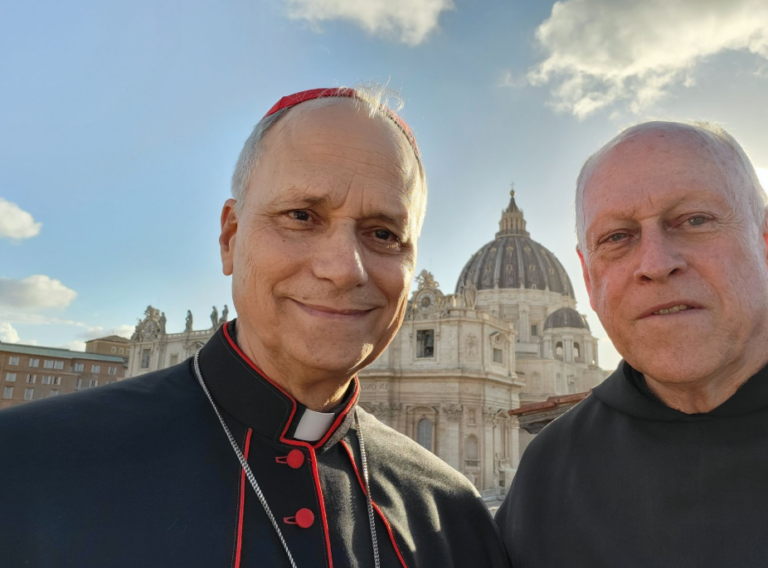Over 100 high school-aged Catholics in the Chicago area packed into the Church of the Holy Family on the morning of Feb. 25 to hear a homily delivered by Cardinal Blase J. Cupich during the third annual Catholic Youth Climate Summit hosted by Catholic Climate Covenant and the Archdiocese of Chicago.
“Today, no one can claim to be a faithful disciple of Jesus if they don’t care about the environment,” said Cardinal Cupich in his homily. “This is a deeply theological issue.”
Cardinal Cupich told the teens about the importance of caring for God’s creation and maintaining a peaceful relationship with all people. Cardinal Cupich spoke about his past work with Indigenous tribes in South Dakota, and the impact that those relationships have had on his Catholic faith.
“Twenty-five years ago, I became familiar with the rituals of Native Americans when I was appointed bishop of Rapid City, South Dakota where there were five Indian reservations,” Cardinal Cupich said. “I learned so much from the Lakota people and at my installation and ordination we had a similar rite of smudging. In fact, it was on a star quilt like the one here that I prostrated on as the community prayed the litany of saints. So, in many ways, I feel at home in a ritual like you have here today.”
Cardinal Cupich also told the teen Catholics that they have credibility as young people concerned about the environment, who have not been part of a generation that have had a negative impact on the environment.
“And so today, you too come to this summit; you are being drawn to it by God’s grace working in your life,” Cardinal Cupich said. “By being part of this work of protecting our environment, the Lord is summoning you to have this broader vision because He sees something in you. He sees that you have what it takes to offer leadership for this very important cause.”
Cardinal Cupich urged attendees to listen to God’s call on how to help the environment next.
“My point is simply this: you are not here just by your decision or your concern but it has been planted in your heart by God,” Cardinal Cupich said. “God has drawn you to this summit, this mountaintop, to give you a different perspective of what it means for you to offer leadership in this important cause. So, take that seriously as you are here today.”
“It was really powerful to hear such a strong message on climate from Cardinal Cupich,” said Kayla Jacobs, Youth Mobilization Program Manager at the Covenant. “I know that our students were really inspired and grateful that he took the time to be there with them. After Mass, he stayed for a Q&A with the summit attendees, and it meant a lot to the students that he listened to their questions and heard their concerns about the climate crisis and their desire to see the Church lift up and act on Laudato Si’.
“The students presented him with a booklet about why they want climate action, and he said he was going to share the booklet with his colleagues at the Vatican. The students were impressed by his willingness to elevate their voices.”
Annaliese, a high school senior in the Chicago area, shared her feelings after Mass.
“The time with Cardinal Cupich was amazing! It was so fun and cool!” Annaliese said.
The full homily
Here is the full transcript of Cardinal Cupich’s homily from the Catholic Youth Climate Summit:
“Good morning, it is good to be here with you today.
I was so pleased that you had the Four Directions smudging rite before Mass. Twenty-five years ago, I became familiar with the rituals of Native Americans when I was appointed bishop of Rapid City, South Dakota where there were five Indian reservations. I learned so much from the Lakota people and at my installation and ordination we had a similar rite of smudging. In fact, it was on a star quilt like the one here that I prostrated on as the community prayed the litany of saints. So, in many ways, I feel at home in a ritual like you have here today.
The Gospel scene, as well as the first reading, portrays people of faith being drawn to the mountaintop. We also hear in the first reading that Abraham is drawn to the mountain, where he thinks he has to sacrifice his son, but in the end, he learns something new about God. So too Peter, James and John go to the mountain and learn something new about Jesus.
Why these three? Well, these disciples were very close to Jesus, and in fact took leadership positions after the resurrection in the life of the Church. Jesus draws them to the mountaintop to see a whole different perspective about his ministry, his life, passion, death and resurrection. With this new panorama, they get a glimpse into what he will be calling them to do.
And so today, you too come to this summit; you are being drawn to it by God’s grace working in your life. By being part of this work of protecting our environment, the Lord is summoning you to have this broader vision because He sees something in you. He sees that you have what it takes to offer leadership for this very important cause.
My point is simply this: you are not here just by your decision or your concern but it has been planted in your heart by God. God has drawn you to this summit, this mountaintop, to give you a different perspective of what it means for you to offer leadership in this important cause. So, take that seriously as you are here today.
And what is the vision being given to you? What vision of the future, of your participation, in this important cause should you take from hearing these scriptures today? First, notice that Jesus appears with Moses and Elijah. They represent those generations of the People of God who have been prompted by the prophetic Word of God, and countless others through Moses and Elijah. They remind you that you are connected to the many generations promised to Abraham, which will be as manifold as the sands on the seashores or the stars in the sky. It is an invitation for you to see the intergenerational importance of what you do. You are the ones who stand on the precipice of the future generations to come. It will be your children, and your grandchildren, and great-grandchildren who will have to live with response or lack thereof to the climate crisis and the trashing of the environment we now face because of our wastefulness. The world is being trashed, our reliance on fossil fuels is creating global warming. Islands and coastlines are being swamped by rising sea levels. What is happening today is what you and the generation to come are going to have to live with. Your children and grandchildren will bear the brunt of the consequences if we do not make dramatic changes.
So, as the Lord brings you to this summit, he wants you to look out ahead and be willing to speak for those generations to come. He is telling you that the world today needs your young voices for the world of tomorrow. It is through your eyes that we can see the future.
A second insight from the Gospel is that after the vision of his transfiguration, in the end, all the disciples see is Jesus. They come to know Jesus and their faith in him differently. The message is clear: your involvement in this important work of saving our planet is not unrelated to faith. No. You do what you do precisely because of your faith. As the Holy Father reminds us in Laudato Si’, God wants us to do this. Jesus, the Word through which all things were made at the beginning of creation, is calling us to do this. We should be willing to push back on the claim that one can be a faithful disciple of Jesus and not care about the environment. Be ready to raise your voice to speak to people of faith about their moral obligation to join in this effort. This is the core of what we believe about this world that God has created. People who have a devotion to Jesus and the traditions of the Church cannot ignore the teachings of Laudato Si’. In the end, as the disciples on that mountaintop see, there is only Jesus. And Jesus is at the center of this cause.
The final thing we see in the Gospel is that Peter, James and John, at the end, go down from the mountain. They talk amongst themselves and they question, “What does it mean for someone to rise from the dead?” This question bonds them for life so that after the resurrection, when Jesus rises from the dead, they can recall that they have been to the mountaintop and seen the panorama before them. That surely is an invitation to all of you who come from different schools. You come from different parts of the city, and from different schools. So, make sure you keep in touch with each other, that you find strength in taking up this work because of the bonding that comes from attending this summit. Be supportive of each other so that this is not just a one-off meeting. Allow the bonds you create today in taking up this work to be an inspiration to strengthen you to be firm for the years ahead and the semesters moving forward.
So today, you are brought to the mountaintop with Jesus, and have responded to come to this summit. It is Jesus who has brought you here, like he did with Peter, James and John. And he gives you the opportunity to see the meaning of this work of protecting the climate. It means appreciation for the connection you have to the future generations and the need to give them a voice through yours, but also your connection to older generations, especially followers of Jesus, that they cannot claim to be his disciples and ignore the importance of protecting our world, this our “common home,” as our Holy Father calls it.
And finally, he has brought you to the mountain TOGETHER so that you will strengthen one another. Let us then continue in this wonderful work you are doing, and like those disciples, when the cloud came over them revealing the glory of Jesus in their midst, they said, “It is good to be here.” Let those words be your own today. It’s good for you to be here.”




